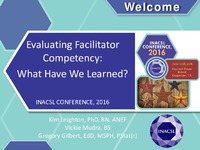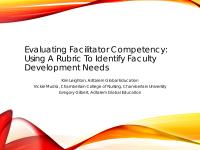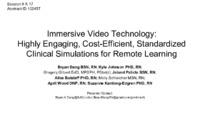| dc.contributor.author | Leighton, Kim | en |
| dc.contributor.author | Gilbert, Gregory E. | en |
| dc.contributor.author | Mudra, Vickie | en |
| dc.date.accessioned | 2016-08-11T16:05:23Z | |
| dc.date.available | 2016-08-11T16:05:23Z | |
| dc.date.issued | 2016-08-11 | |
| dc.identifier.uri | http://hdl.handle.net/10755/618305 | |
| dc.description | <p>Annual Simulation Conference. Held at the Gaylord Texan Resort & Convention Center</p> | en |
| dc.description.abstract | <p>There are no tools available to objectively evaluate simulation facilitators. In light of the findings of the NCSBN simulation study (Hayden, et al., 2014), many nursing programs will increase the use of simulation as a teaching strategy. As more hours are used in this modality, it is vital that educators are competent in their role. Two years ago, work began on the Facilitator Competency Rubric (FCR), a tool designed to help validate facilitator competence as well as identify areas for individual improvement. During development, the tool was shared at all simulation conferences with audience feedback solicited and incorporated. Workshop participants helped to determine rubric content by differentiating between the skills of the novice, competent, and expert facilitator. Study of the psychometric properties of the FCR was undertaken; however, facilitators and raters have been reluctant to participate. This presentation will provide an update on the results of pilot study data and progress in establishing psychometric properties. Various reasons for lack of study participation will be explored—why are we struggling to collect data to validate a tool that ‘everyone’ says is needed? More importantly, the tool will be shared with the audience. Following a brief overview of the major concepts and their components, the audience will practice using the tool to evaluate examples of facilitator behaviors to determine level of competency, which will then be used to identify possible faculty development opportunities.</p> | en |
| dc.format | Text-based Document | en |
| dc.language.iso | en_US | en |
| dc.subject | Clinical Simulation | en |
| dc.subject | Facilitator Competence | en |
| dc.subject | Tool Reliability and Validity | en |
| dc.title | Evaluating facilitator competency: What have we learned? | en |
| dc.type | Presentation | en |
| dc.rights.holder | <p>
All rights reserved by the author(s) and/or publisher(s) listed in this item record unless relinquished in whole or part by a rights notation or a Creative Commons License present in this item record.
</p><p>
All permission requests should be directed accordingly and not to the Sigma Repository.
</p><p>
All submitting authors or publishers have affirmed that when using material in their work where they do not own copyright, they have obtained permission of the copyright holder prior to submission and the rights holder has been acknowledged as necessary.
</p> | |
| dc.description.note | <p>Items submitted to a conference/event were evaluated/peer-reviewed at the time of abstract submission to the event. No other peer-review was provided prior to submission to the Henderson Repository, unless otherwise noted.</p> | |
| dc.type.category | Full-text | en |
| dc.evidence.level | N/A | en |
| dc.research.approach | N/A | en |
| dc.author.details | Kim Leighton, PhD, RN, ANEF; Gregory E. Gilbert, EdD, MSPH; Vickie Mudra, BS | en |
| dc.conference.name | International Nursing Association for Clinical Simulation and Learning Annual Conference 2016 | en |
| dc.conference.host | International Nursing Association for Clinical Simulation and Learning | en |
| dc.conference.location | Grapevine, TX, USA | en |
| dc.date.conferenceyear | 2016 | en_US |
| dc.contributor.affiliation | International Nursing Association for Clinical Simulation and Learning (INACSL) | en |
| dc.description.reviewtype | Abstract Review Only: Reviewed by Event Host | en |
| dc.description.acquisition | Proxy-submission | en |





